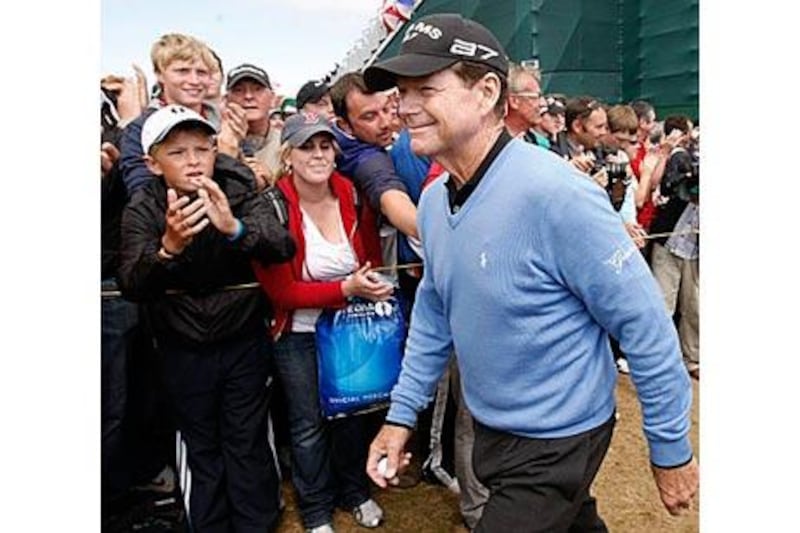Now the dust has settled on Tom Watson's thrilling performance in the British Open golf championship, we may have to reassess our attitudes to age in sport. The 59-year-old warrior's skill and tenacity in coming within a whisker of being the oldest competitor to get his hands on the Claret Jug gave new heart to those of us of similar vintage.
And while it may be around 30 years too late for me to be considered a viable option for the England football team, I still found myself walking with a new spring in my step this week - or, if not a new spring, at least hobbling a little less painfully. I wonder if the tide has turned, and sport need not worship at the altar of youth, because it is not just in golf where the march of time has been defied. It is only a slight exaggeration to say this has been the Summer of the Oldie in sport.
Consider the evidence. Sir Alex Ferguson, the Manchester United manager, having clearly laid out a policy of only signing players of 26 or younger, buys 29-year-old Michael Owen, and Owen repays him with two goals on the pre-season tour of Malaysia. Owen may be mostly an impact player, a second-string attacker to Rooney and Berbatov, but Fergie has clearly recognised that in the hurly burly of the English Premier League, the wisdom of age sometimes trumps youthful vitality.
It is the experience of intense competition and the ability to cope with it - noticeable in Watson up until the final hole of the 72 - that will enable Owen to make an impact at Old Trafford, just as the 35-year-old Henrik Larsson did in the early months of 2007 on loan from Helsinborg. And let us not forget another oldie signed by Ferguson, Teddy Sheringham, bought from Spurs at the age of 31, and a key contributor to United's historic Treble in 1999. Even as a 38-year-old playing for West Ham, Sheringham's speed of thought, and wisdom of the ways of football enabled him to rise above the general melee.
In tennis, too, this summer has brought encouraging news for those of us for whom time's winged chariot is not only approaching but flashing its lights and pulling out to overtake. While all the talk has been of youngsters like Rafael Nadal, Andy Murray and Juan Martin Del Potro, some of the relative veterans sneaked almost unseen into the last eight at Wimbledon. Tommy Haas (31), Ivo Karlovic (30), 28-year-old Lleyton Hewitt and Juan Carlos Ferrero, at 29, were all quarter-finalists, and even Andy Roddick (26) was an older finalist than we have been used to.
Clearly, advances in training, nutrition and sports medicine have enabled careers to be extended, but I think there is more to it than that. I believe that in the past we have been too dismissive of the veteran. We love it when our football team buy an exciting young prospect, but get all sniffy when an old warhorse that has been round the block a time or two climbs on board. Well, after Watson's heroics at Turnberry, it is surely time to think again. Even sceptical United fans are beginning to wonder if Owen is the ingredient that will enable them to retain their title. So I tip my hat to Watson, who gave us oldies the greatest boost since wrinkly old Michael Douglas courted and married Catherine Zeta-Jones.
Footballers in Britain occasionally complain about the intrusiveness of the press in the UK, and it is true that if they want to hang around in nightclubs until four in the morning, they may well get a kicking in print. But let them go to Spain, where the press gives them not amoment's peace. More than 60 Spanish journalists crammed into Shamrock Rovers' tiny ground in Ireland the other day for a friendly against Real Madrid, scrutinising new signing Cristiano Ronaldo's every move. The combination of that, and some robust Irish defending frustrated Ronaldo, who now knows his biggest challenge in football lies ahead. If he meets it, he will become one of the true all-time greats.
I may have mentioned before that I play a little tennis with a fellow journalist. Our problem is that neither of us has the killer instinct, so we tend not to capitalise on the other's weakness. In a way, we are a little like England and Australia in the current Ashes series. Neither team, having got into a winning position, seem wholly capable of turning the screw, and it is only Andrew Flintoff's virtuoso solo at Lord's that has given England the advantage. It all makes for a fascinating and unpredictable series, though. Roll on Thursday, and Edgbaston.
mkelner@thenational.ae





